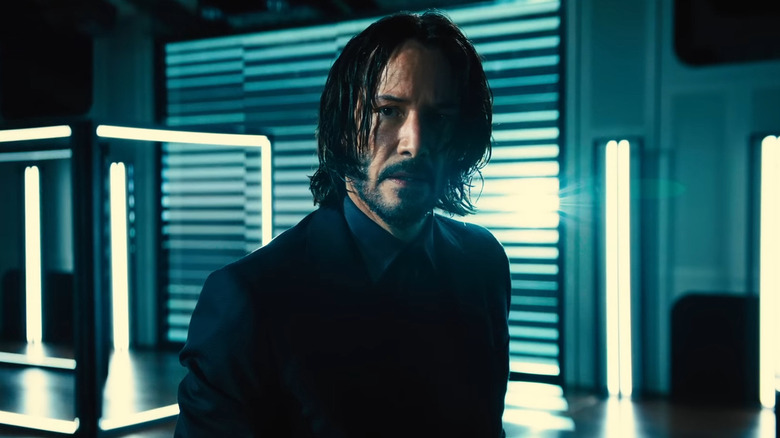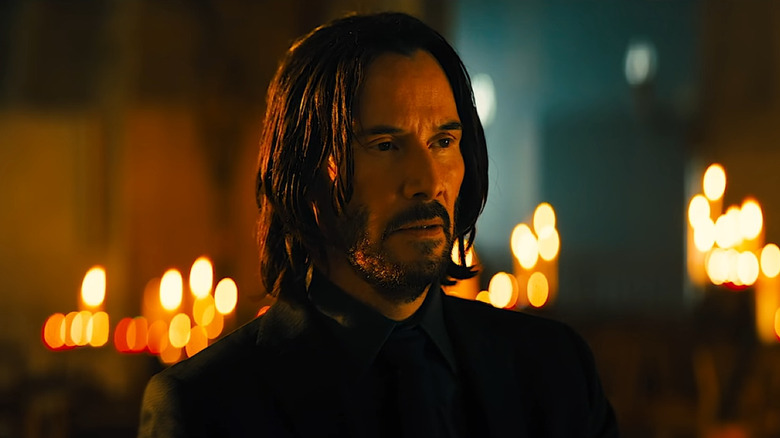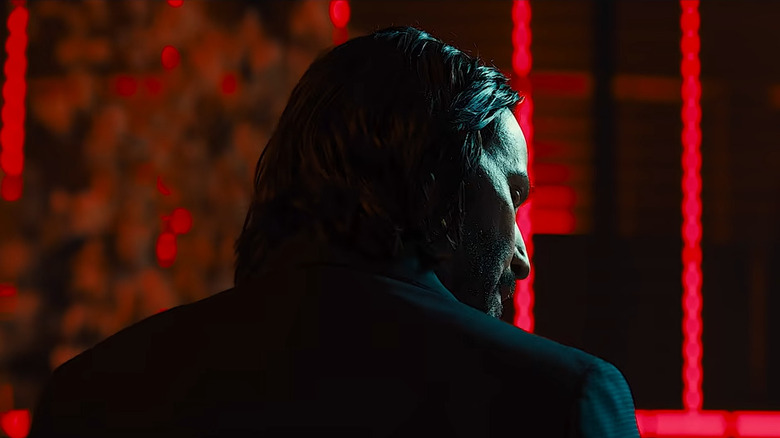John Wick 4: Keanu Reeves Details How That Solemn Ending Came About
Contains spoilers for "John Wick: Chapter 4"
After a long wait, fans finally got another glorious look at the Baba Yaga, with the return of Keanu Reeves in the fourth (and final?) installment of his blockbuster franchise, "John Wick: Chapter 4." While the film brought us everything we knew we would see, like beautiful set pieces and action sequences in clubs, to enough bullets to overtake a small country, it also brought some surprises. From the destruction of Winston's (Ian McShane) Continental Hotel to the scene in the final moments that everyone is talking about: the apparent death of John Wick. Now, Reeves has explained that was the plan the moment the movie came about, even saying it was the entire point of the film.
After three films of being shot, stabbed, hanged, hit by cars, and left in the desert to die, fans began to get the feeling that our beloved Boogeyman killer was indestructible. That is when the filmmakers threw the curveball that fans weren't expecting. That is obviously the very first thing that Reeves had to answer for when a fan asked him about the ending.
According to The Hollywood Reporter, Reeves spoke about what made him and director Chad Stahelski want to make yet another "John Wick," besides just the fans wanting one. "'What was the Why?'... And when Chad and I was talking, the Why? was death — and it was John Wick's death. For him to get his peace, or freedom, in a way...that was the reason to make the movie. It can't just be, 'Let's do another one.' It was really about death, or a way of dying. We were really inspired by the 'Hagakure.'"
Hagakure is a fitting inspiration
"Hagakure," also known as "The Book of the Samurai," is a collection of teachings for warriors. While the setting of the final film took place partly in Japan as a fitting tribute to their inspiration, the book itself seems to have been a common theme throughout the entirety of the franchise. There are quotes throughout the writing that seem to apply perfectly to the world of the Continental and, of course, the warrior John Wick.
"Even if it seems certain that you will lose, retaliate." This quote from the book feels as though it is the core center of the entire franchise. What began as a simple quest for revenge for the killing of one dog ballooned into one man fighting an unwinnable battle against an unrelenting force. Through four films, John was never supposed to win, and eventually, he would find his end at the hands of the life he led.
"Even if you are aware that you may be struck down today and are firmly resolved to an inevitable death if you are slain with an unseemly appearance, you will show your lack of previous resolve, will be despised by your enemy, and will appear unclean." Of course, The Bowery King (Laurence Fishburne) referenced this quote best when offering up a crisp black suit to John, when he commented that every man should look his best on the day that he is married, and the day that he is buried. John always fought in a suit (likely because it was ballistic and shielded him from the barrage of bullets constantly fired his way), but there is something to be said about looking your best, even when doing your worst.
Death is a fitting end
Death is everywhere in the "John Wick" franchise. From John's past as a harbinger of human expiration and his wife's devastating death at the hands of an illness to his unending quest to destroy everything in his path, it seems there was no other way to end this franchise than his own moment of finding peace in his death. John was a man living purely driven by one mission, and once accomplished, there wouldn't seem to be anywhere else for him to go.
And John isn't the only character whose death found a fitting and emotional end. The character of Charon was killed in the early minutes of the film, with a gut-wrenching "It's been a pleasure" uttered to Winston. That moment hit heavily, knowing that actor Lance Reddick passed away only days before the premiere. The moment of an on-screen death echoing a real-life death brought the theme and the ending more meaning, even if that particular angle was devastatingly unintentional.
"The way of the samurai is found in death." This quote from "Hagakure" is the defining theme for all of the franchise. John has established himself as one of the greatest warriors in cinematic history, and with ties to the Japanese culture — with Osaka playing a big part in the final film — the samurai view on death represents the only path that could realistically be taken. Watching the man we grew to believe to be indestructible over the last decade die was undoubtedly one of the most emotional and gut-wrenching moments Reeves has delivered. But when his future is considered on the prospect of survival, a life without his wife, and constant pain and suffering in grief, this ending seems fitting. It is ultimately what the samurai call a good death.


